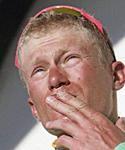
Recently on Cyclingnews.com |
An interview with Alexandre Vinokourov, October 26, 2003
In Vino, veritas
Alexandre Vinokourov's trip to San Francisco wasn't his first voyage stateside. Seven years prior, the Team Telekom rider traveled to the USA to represent Kazakhstan in the 1996 Atlanta Olympic Games. However, this time around, Vino came to San Francisco at the invitation of T-Mobile's Chairman Bob Stapleton and sports marketing guru Herwig Reus to represent his team at the T-Mobile International.
In 2004, Vinokourov's team will change its name to T-Mobile and since his ride at the San Fran GP, it's been confirmed that the Kazakh rider will be reunited with his good friend and former team-mate Jan Ullrich. A few days before his 30th birthday, Cyclingnews' European Editor Tim Maloney sat down with the Tour de France's most combative rider about his best season to date as a pro cyclist.
Cyclingnews: In 2003, you've shown all season long that you are a force to be reckoned with, that you've become one of the top pro cyclists in the world. How would you judge your season this year?
Alexandre Vinokourov: Well, I prepared specially for the early season this year and above all for the Tour de France, but it was harder than I thought to maintain my morale after the death of my friend Andrei Kivilev. Kivi was like a brother to me and it was hard to find my morale after his death, but I decided to carry on, to maintain my momentum in the races and after that I had some big successes, some big wins [Paris-Nice, Amstel Gold]. But above all, it was my performance in the Tour de France where I was most satisfied about my 'formidable' season.
CN: Was the tragic death of your friend Kivilev something that was hard to bear mentally or was it also a factor that motivated you?
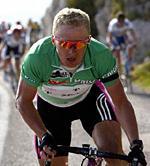 |
AV: Oh, it was really hard to bear when it happened... I almost abandoned Paris-Nice, but when I spoke to my friends about it, I was motivated again to keep racing. Because I realized that if I won (Paris-Nice) again, it was something I could dedicate to him. So it was difficult to take the start for (Stage 4's) time trial, but then I won the stage to Mont Faron, taking the race lead and keeping it until Nice. So I was able to give that gift to Kivi, to win Paris-Nice for him... that was the maximum I could have done then.
CN: That stage win on Mont Faron was a very important one for you to commemorate Kivilev.
AV: Yes, that's true... after Kivi died, there were a lot of people who called me to give me support and so I wanted to win that day for him. I did my best and I succeeded.
"The main thing is that the Kazakh managed to make the greats feel nervous."- Kazakh paper Novoye Pokolenie praising Vinokourov's performance at the Tour de France |
CN: Vino, you are kind of the leader for all Kazakh riders who are racing in Europe. You seem to look out for your fellow Kazakh riders and try to help them?
AV: Yeah, for sure... I came to Europe with Kivi [in 1997] to race and so I've done the maximum to help other Kazakh riders like Yakovlev, Usseuv, Fofonov... but once they get here, they have to make it on their own. I helped Yakovlev get a ride on an amateur team and he did well afterwards. I also try to help our national team if I can. The last time I was able to help the national team it was to get some clothing from [Team Telekom sponsor] Adidas. If I can help a Kazakh rider who calls me for advice on a contract or what a team is like, I try to help if I can. These guys know I have more experience than them, so I do what I can.
CN: Kazakhstan, cycling, well the origin must be from the Soviet school of cycling... but is there another unique characteristic of Kazakh riders?
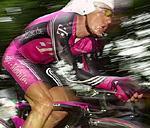 |
AV: Not really; Kazakh riders come from the basis of the former the Soviet Union cycling; we started young in a sports school to learn the basic fundamentals, with plenty of running in the winter. To learn cycling that way for me was a good experience, a good memory.
CN: Are there many up and coming young riders from Kazakhstan?
AV: Yes there are a lot of good guys now... I think that Andrey Kashechkin has shown a lot so far and will continue to improve in the future; maybe not in stage races, but he's a good rider for the classics. He rides well in Belgian races. In the Kazakhstan espoir [under 23] team, there are some good 21 or 22 year old guys as well who aren't riding badly. Let's see how they do in the Tour de l'Avenir against the pros.
When I went back to Kazakhstan after the Tour de France, the Prime Minister and I discussed the possibility of a third division cycling team sponsored by Kazakhstan that would have a place for these good young riders. I think that's a good idea and as the young riders develop in the amateur races in Europe and get good results, there will be a place for them in this team. [The Prime Minister of Kazakhstan, Daniel Akhmetov, is a former racing cyclist who still rides for pleasure and fitness.]
CN: How was your trip back to Kazakhstan after the Tour? Did you celebrate your great ride in the Tour?
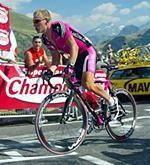 |
AV: I was there a week or so and it went quickly... too quickly. I went back with my wife and we saw our families and the Prime Minister, the Minister Of Sport and the President of the (Kazakh) Olympic committee. The Olympic Committee awarded me a special medal for my Tour ride and as you know, it's always good to go home, to see everybody back there.
We had a party in the National Restaurant and toasted with vodka and ate some special Kazakh dishes... it's very fatty food, with roast lamb and mutton and horse meat. I didn't celebrate too much because I still had a few races to do, but when I go back in mid-October for a few weeks, I can relax more and go fishing or hunting, visit my friends and play soccer too. [According to Agence France-Presse, Kazakhstan weekly newspaper Karavan proclaimed that: "Alexandre has shown he can fight with the greatest monsters of world cycling" - while another paper Novoye Pokolenie praised Vinokourov's attacking spirit in the mountains and winning Stage 9 in the Tour: "The main thing is that the Kazakh managed to make the greats feel nervous."]
CN: This is your second trip to the United States and the first time on the West Coast. What are your impressions?
AV: This is my first time in San Francisco and I like it a lot. The course is tough, especially that climb [Fillmore St], but my sponsor Telekom asked me to come so I'm happy to do it. There were so many people at the race yelling for me - it was great. But even before that, when I was riding around San Francisco or over the bridge, a lot of people knew who I was and yelled my name... it was a nice surprise and I enjoy it when people all over the world know me.
CN: Too soon to discuss 2004, or not - what do you have in mind for next season?
AV: I have a few ideas next year; my two objectives will be the Tour de France and Olympic Games. The Olympics are quite important for Kazakhstan. I discussed the Olympics when I was back home with the Olympic Committee. So I'll really give it my maximum in Athens and also hope for a good place in the Tour de France. I had a great performance in Sydney [silver medal in the men's road race] so I want to do well again in the Olympics. But it won't be easy; there will be 200 other riders going for the medals too.
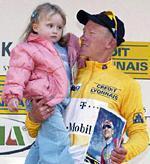 |
AV: I want to tell Cyclingnews about the Andrei Kivilev Foundation, too.
CN: Sure, can you elaborate?
AV: We have created this foundation to help Andrei Kivilev's family, his wife and kids and other family in Kazakhstan. He has two brothers there and was helping his family out from his pro salary. It's been pretty hard for them since Kivi died in March. So that's why we created the Andrei Kivilev Foundation.
After his trip to San Francisco, Vino returned to his European home in Monaco for a few weeks before jetting to Kazakhstan again, this time with his friend Jan Ullrich, some Telekom teammates and a few Kazakh riders for a memorial criterium in honour of Andrei Kivilev in Alma Aty, which Vino won. Vino was last seen at the 2004 Tour de France presentation last week in Paris, again sitting next to his friend and new team-mate Jan Ullrich, a sight that might concern five-time Tour de France winner Lance Armstrong, sitting just a few seats away.
Donations to the Andrei Kivilev Foundation can be sent via bank check or wire transfer; details as follows:
Check
Foundation Andrei Kivilev
c/o: Societe Monegasque de Banque Privee' Monaco
9, Bouevard d'Italie
98000 Monaco
International wire transfer
Societe Monegasque de Banque Privee' Monaco
IBAN# MC5813719000013120523909290

